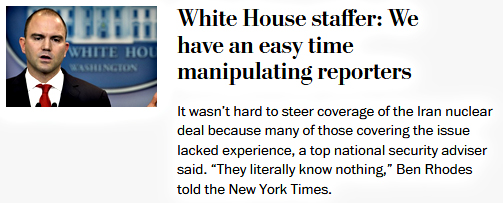A couple of days ago the New York Times posted a long profile by David Samuels of White House communications guru Ben Rhodes. It turns out that in private Rhodes is pretty contemptuous of the foreign policy establishment, and thanks to the Times profile he’s now contemptuous in public too. He also has some harsh words for the press, and as you might expect, the press has taken this with its usual thick skin. This piece by Carlos Lozada is typical. And here’s a typical headline:

Is that a fair summary? In the Times profile, Rhodes describes how his communications shop tries to spin the news. By itself, this isn’t much of a revelation. That’s what communications people do. But was Rhodes really bragging about how easy it was to con reporters? The relevant excerpt comes after the reporter (not Rhodes) explains the “radical and qualitative” ways the news business has changed recently:
Rhodes singled out a key example to me one day, laced with the brutal contempt that is a hallmark of his private utterances. “All these newspapers used to have foreign bureaus,” he said. “Now they don’t. They call us to explain to them what’s happening in Moscow and Cairo. Most of the outlets are reporting on world events from Washington. The average reporter we talk to is 27 years old, and their only reporting experience consists of being around political campaigns. That’s a sea change. They literally know nothing.”
Is Rhodes displaying arrogance or smugness here? That’s not how I took it when I initially read the piece. To me it scanned as an expression of regret. Rhodes himself is never quoted as being cocky or patronizing about his ability to shape foreign affairs reporting. He’s just describing what he has to deal with, and explaining how that affects the way a modern White House press shop works. More digital, less print. More tutoring of young reporters, fewer tough questions from area experts.
Am I nuts for reading it this way? For those of you who have read the Times piece—And don’t lie! Did you really read it?—what was your takeaway? Is Rhodes arrogant and manipulative? Or unhappy with the state of journalism but realistic about how it affects the way he does his job?
UPDATE: It’s worth being very careful when you read the Times profile. You need to distinguish between what Rhodes says and how Samuels frames the quotes. Rhodes himself is fairly anodyne. In the quote above, for example, Rhodes is merely saying something that lots of reporters say too. It’s Samuels who labels this as “brutal contempt.”


















